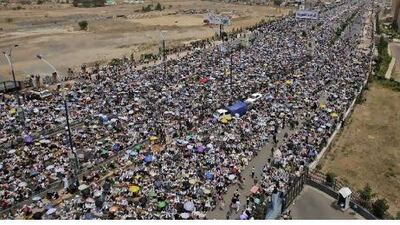MUKALLA // Thousands of soldiers are involved in a hunt for 63 Al Qaeda suspects who broke out of prison in the city of Mukalla, a security official said.
The Interior Ministry announced on Saturday that it captured two of the prisoners who broke out last Wednesday. It also confirmed that three prisoners were killed during the escape.
The official said inmates at Mukalla central security prison are being interrogated to find out how the prisoners were able to escape. "It was a shock to all of us and the 35-metre hole they dug proves that they were planning this for months," the security official said.
The escape was the biggest prison break-out by suspected Al Qaeda members in Yemen's history. The official said that the prison warden, his deputy and at least 15 guards and employees at the prison are being questioned.
Rewards were announced for information leading to the recapture of the escapers.
The interior ministry warned that some of the escapers were a threat to the stablility and safety of the country. It said that nearly a third of the escapers had been arrested after they came back from Iraq, where they had been fighting western troops.
An interior ministry official said: "Some of the prisoners are highly trained in explosives. This could be a negative turning point in the Yemen war on terror if the government is not able to arrest them quickly."
With the Yemeni government planning to increase its military power in Hadramout and Shabwa provinces, it will be forced to decrease its presence in areas where Islamic militants have taken control, such as Abyan and Lahj provinces.
Ahmed Al Soufi, an adviser to the president, Ali Abdullah Saleh, said that the Yemeni government's capacity was limited and it needed international assistance to fight terror.
"We need to fight militants in numerous fronts around the country while no one is willing to support us. That is why we shouldn't be blamed," he said.
Mr Saleh said in late May, in one of his last public speeches, that if he left the presidency, five provinces would be taken over by Al Qaeda fighters.
Among the provinces he mentioned were Abyan and Shabwa.
For many, the prison escape did not come as a surprise and they blamed the government.
Nasser Ba Kizkooz, the spokesperson for the Civil Society Organisations in Hadramout, said that the escape took place with the help of the government.
He said such a large escape could never have taken place without the knowledge and help of officials from within the prison. "No other sides benefit and the ruling family want to make President Saleh's promise of Al Qaeda controlling the south come true," he said.
The Joint Meeting Parties immediately held security officials loyal to the ruling family responsible for the escape. Ahmed Bahri, the head of the political circle in the Haq party, said: "President Saleh is the main provider and supporter of Al Qaeda in Yemen. He releases them from prison to ensure their loyalty when he needs them to fight in his favour."
Mr Bahri said that fighting Al Qaeda was a strategy the regime feels would force the international community to support it and delay political change.
"We will have to wait and see if western powers fall in the Al Qaeda trap of the regime," Mr Bahri said.
Four soldiers were killed and five others injured on Friday when a suicide bomber boarding a vehicle exploded at a military checkpoint. The attack took place 500 metres from a military base in Aden.
Security officials said Al Qaeda was behind the attack and considered it a warning sign.
"Militants are trying to take over numerous parts of South Yemen, and Aden has been their prime target all along," said Munsif Saleh, a security official in Aden.

